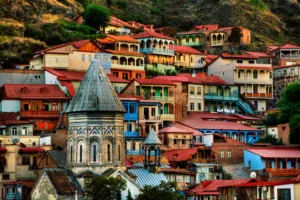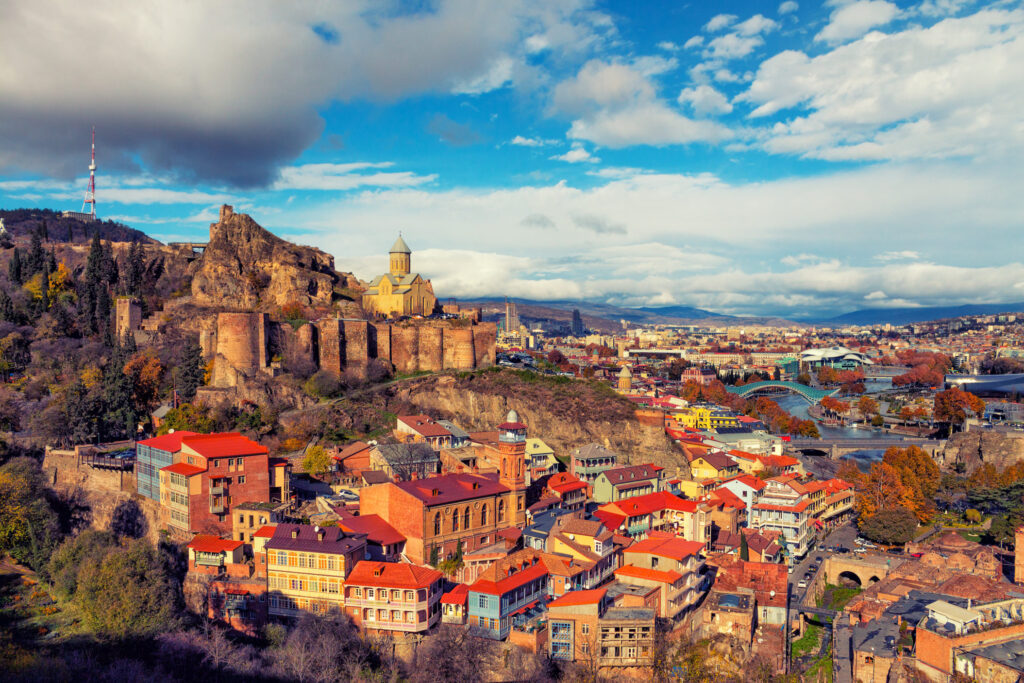Travel to Georgia: Discovering Georgia: A Journey Through History, Culture, and Nature

Tbilisi: The Heart of Georgia
Tbilisi, the capital city, is a vibrant tapestry of old and new. With its charming cobblestone streets, eclectic architecture, and lively atmosphere, it is the perfect starting point for any journey in Georgia. Explore the Old Town, where traditional wooden balconies overlook narrow alleyways filled with cafes, art galleries, and shops.
One of the city’s most iconic landmarks is the Narikala Fortress, which offers stunning views of Tbilisi and the Kura River. A hike up to the fortress, or a ride on the cable car, rewards visitors with panoramic vistas that capture the essence of this enchanting city. Don’t miss the chance to visit the sulfur baths in the historic district of Abanotubani, where you can relax in the mineral-rich waters that have been enjoyed for centuries.
The Cultural Richness of Georgia (Travel to Georgia)
Georgia’s cultural heritage is deeply rooted in its traditions, art, and religion. The country boasts a unique alphabet, one of the oldest in the world, and a rich folklore that reflects its diverse history. Georgian polyphonic singing, recognized by UNESCO, is an integral part of the national identity and is often performed at traditional feasts called “supra.”
When in Tbilisi, visit the Georgian National Museum to learn about the country’s history, from ancient times through the Soviet era to the present day. The museum houses a vast collection of artifacts, including the famous Golden Fleece, which tells the story of Jason and the Argonauts.
Culinary Delights: A Taste of Georgia (Travel to Georgia)
No trip to Georgia is complete without indulging in its delectable cuisine. Georgian food is a reflection of the country’s agricultural abundance and cultural influences. The staple dishes include khachapuri (cheese-filled bread) and khinkali (dumplings filled with meat and spices). Each region of Georgia has its own specialties, making the culinary landscape diverse and exciting.
Wine is another integral part of Georgian culture, as the country is one of the oldest wine-producing regions in the world. The Kakheti region, in particular, is renowned for its vineyards and traditional winemaking methods, which involve fermenting grapes in clay vessels called qvevri. A visit to a local winery for a tasting and tour is a must for any wine lover.
Nature’s Splendor: The Great Outdoors (Travel to Georgia)
Georgia’s landscape is nothing short of breathtaking, offering a variety of outdoor adventures. The Greater Caucasus Mountain range, which runs along the northern border, provides numerous opportunities for hiking, skiing, and mountaineering. Kazbegi National Park, home to the iconic Gergeti Trinity Church perched on a hill, is a popular destination for hikers seeking stunning views of Mount Kazbek.
The Svaneti region, with its medieval stone towers and remote villages, is another gem for nature enthusiasts. The UNESCO World Heritage site of Ushguli, one of the highest inhabited villages in Europe, offers a glimpse into the ancient way of life amidst dramatic mountain scenery.
For those looking to relax, the Black Sea coast offers beautiful beaches and charming seaside towns like Batumi. The city combines modern architecture with traditional elements and is a great place to unwind after exploring the mountains.
Historical Treasures: A Glimpse into the Past (Travel to Georgia)
Georgia is steeped in history, and its ancient churches and monasteries are a testament to its rich spiritual heritage. The UNESCO World Heritage site of Mtskheta, one of the oldest cities in Georgia, is home to several significant religious buildings, including the Svetitskhoveli Cathedral and the Jvari Monastery. These sites are not only architectural marvels but also vital to the country’s Christian heritage.
Another historical highlight is the cave city of Uplistsikhe, which dates back to the early Iron Age. Carved into rock, this ancient settlement features a complex of caves, tunnels, and structures that provide insight into the life of Georgia’s early inhabitants.
Hospitality and Warmth: The Georgian Spirit (Travel to Georgia)
One of the most endearing aspects of Georgian culture is its hospitality. Visitors are often welcomed with open arms and treated to the traditional “supra,” a feast characterized by an abundance of food, wine, and heartfelt toasts. The tamada, or toastmaster, plays a crucial role in guiding the celebrations, ensuring that every guest feels honored and included.
Engaging with locals can enhance your experience, providing deeper insights into their way of life, traditions, and customs. Whether in bustling cities or remote villages, the warmth and generosity of the Georgian people leave a lasting impression.
Practical Tips for Travelers (Travel to Georgia)
When planning your trip to Georgia, consider the following practical tips:
1. Visa Requirements: Many nationalities can enter Georgia visa-free for up to a year. Check the current regulations based on your citizenship before traveling.
2. Transportation: Tbilisi has a well-connected public transport system, including buses and metro. For exploring other regions, consider renting a car or joining a guided tour.
3. Currency: The official currency is the Georgian Lari (GEL). Credit cards are widely accepted in cities, but it’s a good idea to carry cash when visiting rural areas.
4. Language: While Georgian is the official language, many people, especially in tourist areas, speak English. Learning a few basic phrases in Georgian can enhance your interactions.
5. Best Time to Visit: The best time to visit Georgia is during the spring (April to June) and fall (September to October) when the weather is mild and the landscapes are particularly beautiful.



